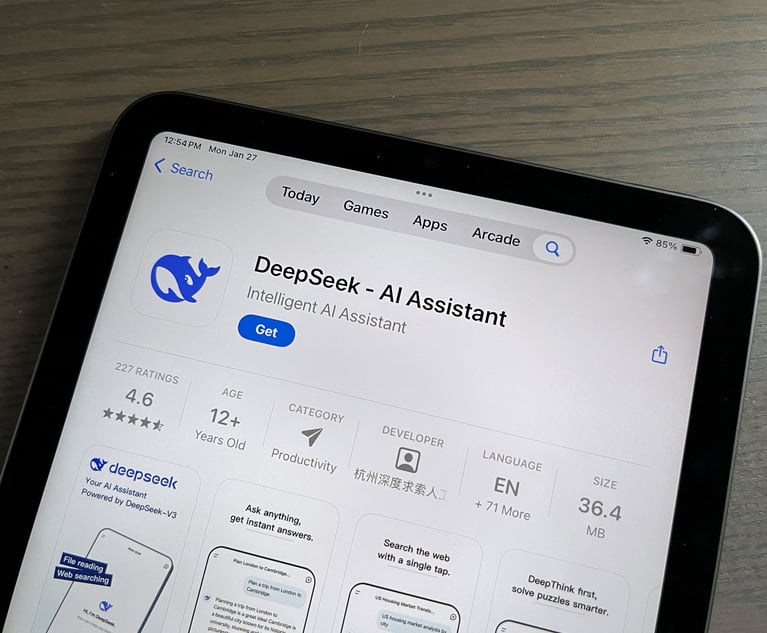New Ethics Opinions Tackle Client Loans, Crowdfunding
When clients use finance companies or crowdsourcing platforms to pay legal fees, lawyers have stricter ethics obligations if they're closely involved with the fundraising efforts, bar associations say.
November 29, 2018 at 03:10 PM
5 minute read
The original version of this story was published on The American Lawyer

Lawyers can refer clients to a finance company to help cover legal costs, but lawyers that hold an ownership stake in such a business must tell clients and direct them to independent advice before they take a loan, the American Bar Association said in a new ethics opinion.
The ABA Standing Committee on Ethics and Professional Responsibility published a formal opinion Tuesday that lays out a series of ethical concerns related to outside financing of legal work. The ABA's opinions typically interpret how the bar association's model rules of professional responsibility apply to issues that may affect a large swath of lawyers across the country.
The ABA model rules and opinions are not binding, but state ethics bodies often consider them when determining how to apply or amend their own local professional responsibility rules. One of those bodies, the District of Columbia Bar, recently issued an ethics statement of its own that dealt with a separate type of outside funding for legal expenses—namely, crowdfunding efforts in which a client solicits donations to pay for lawyers.
In each case, ethics obligations differ depending on the lawyer's level of involvement with the funding efforts, according to the recent opinions.
Tuesday's opinion explains how the ABA's model rules apply to situations in which a client turns to a finance company or brokerage in search of a loan that could help cover legal expenses. Lawyers are generally allowed to refer clients to an outside finance company, the ABA said, but the lawyer's ethical obligations depend in part on whether the lawyer has any sort of ownership stake in the finance company.
“It is conceivable that a lawyer might acquire an ownership or other financial interest in a finance company or brokerage, or wish to form such a business,” the ABA wrote in Tuesday's opinion. “If a lawyer did so and referred a client to that entity, the lawyer would be entering into a business transaction with the client or would be acquiring a security or pecuniary interest adverse to the client, or both.”
In light of potential conflicts, a lawyer who holds a stake in a finance company and wants to refer clients there would have to make sure the transaction has fair and reasonable terms and that those terms are explained in a way the client can understand, the ABA said. A lawyer in that position should also advise their client that they might want to seek independent legal advice before taking out a loan. Finally, the client would have to agree in writing to the terms of the transaction and the lawyer's role in it, the ABA added.
Even if the lawyer does not have a stake in the finance company or brokerage, the ABA opinion still lays out ethical obligations, including that the lawyer should explain to clients what the financing arrangement will entail, how it will work, and the costs and benefits of the transaction. But lawyers also have to exercise caution to avoid giving their clients the impression that they're using their professional judgment if they provide input to a client on a possible financing arrangement, the ABA added.
Much like the ABA's ethics opinion, the D.C. Bar's take on the separate issue of crowdfunding for legal expenses also calls for stricter limitations on lawyers if they're directly involved in the fundraising effort.
“When the lawyer directs the crowdfunding, the lawyer must comply with the rules governing a lawyer's receipt of money from third parties. Further, a lawyer who directs the crowdfunding should be cognizant of ethical obligations regarding fee agreements, communications with donors, and the management of the funds raised,” the D.C. Bar wrote in its November opinion.
The D.C. Bar opinion also runs through risks that can come along with crowdfunding, where a person typically turns to social media or other online platforms to raise small amounts of money from a large number of people. Specifically, the opinion said those kinds of fundraising efforts are susceptible to fraud, money laundering or other illegal and unethical activities. In light of those concerns, they should take steps “to avoid unwittingly engaging or assisting in unethical or illegal conduct.”
For situations in which crowdfunding is handled solely by a client and the lawyer is “merely aware” of that effort, the D.C. Bar wrote, “The lawyer incurs no specific ethical obligations.” But, the bar cautioned that even in those situations, lawyers would be well served to consider risks that might come along with funding a lawsuit through crowdsourcing. One specific concern relates to confidential information and legal strategy.
“While lawyers should always be mindful of their duty of confidentiality, the informal nature of communications made through social media platforms warrants a reminder of this duty when using these platforms for crowdfunding,” the D.C. Bar wrote.
Read More:
ABA Says Lawyers Must Monitor for Data Breaches, Inform Affected Clients
ABA Guidance Details Obligations After Hurricanes, Other Disasters
This content has been archived. It is available through our partners, LexisNexis® and Bloomberg Law.
To view this content, please continue to their sites.
Not a Lexis Subscriber?
Subscribe Now
Not a Bloomberg Law Subscriber?
Subscribe Now
NOT FOR REPRINT
© 2025 ALM Global, LLC, All Rights Reserved. Request academic re-use from www.copyright.com. All other uses, submit a request to [email protected]. For more information visit Asset & Logo Licensing.
You Might Like
View All
Eighth Circuit Determines No Standing for Website User Concerned With Privacy Who Challenged Session-Replay Technology
7 minute read
The Time Is Now for Employers to Assess Risk of Employees’ Use of DeepSeek
4 minute read
Fired by Trump, EEOC's First Blind GC Lands at Nonprofit Targeting Abuses of Power
3 minute read
Houston Law Firm Files $250K Breach of Contract Suit Against 2 Former Lawyers
3 minute readTrending Stories
- 1Public Notices/Calendars
- 2Wednesday Newspaper
- 3Decision of the Day: Qui Tam Relators Do Not Plausibly Claim Firm Avoided Tax Obligations Through Visa Applications, Circuit Finds
- 4Judicial Ethics Opinion 24-116
- 5Big Law Firms Sheppard Mullin, Morgan Lewis and Baker Botts Add Partners in Houston
Who Got The Work
J. Brugh Lower of Gibbons has entered an appearance for industrial equipment supplier Devco Corporation in a pending trademark infringement lawsuit. The suit, accusing the defendant of selling knock-off Graco products, was filed Dec. 18 in New Jersey District Court by Rivkin Radler on behalf of Graco Inc. and Graco Minnesota. The case, assigned to U.S. District Judge Zahid N. Quraishi, is 3:24-cv-11294, Graco Inc. et al v. Devco Corporation.
Who Got The Work
Rebecca Maller-Stein and Kent A. Yalowitz of Arnold & Porter Kaye Scholer have entered their appearances for Hanaco Venture Capital and its executives, Lior Prosor and David Frankel, in a pending securities lawsuit. The action, filed on Dec. 24 in New York Southern District Court by Zell, Aron & Co. on behalf of Goldeneye Advisors, accuses the defendants of negligently and fraudulently managing the plaintiff's $1 million investment. The case, assigned to U.S. District Judge Vernon S. Broderick, is 1:24-cv-09918, Goldeneye Advisors, LLC v. Hanaco Venture Capital, Ltd. et al.
Who Got The Work
Attorneys from A&O Shearman has stepped in as defense counsel for Toronto-Dominion Bank and other defendants in a pending securities class action. The suit, filed Dec. 11 in New York Southern District Court by Bleichmar Fonti & Auld, accuses the defendants of concealing the bank's 'pervasive' deficiencies in regards to its compliance with the Bank Secrecy Act and the quality of its anti-money laundering controls. The case, assigned to U.S. District Judge Arun Subramanian, is 1:24-cv-09445, Gonzalez v. The Toronto-Dominion Bank et al.
Who Got The Work
Crown Castle International, a Pennsylvania company providing shared communications infrastructure, has turned to Luke D. Wolf of Gordon Rees Scully Mansukhani to fend off a pending breach-of-contract lawsuit. The court action, filed Nov. 25 in Michigan Eastern District Court by Hooper Hathaway PC on behalf of The Town Residences LLC, accuses Crown Castle of failing to transfer approximately $30,000 in utility payments from T-Mobile in breach of a roof-top lease and assignment agreement. The case, assigned to U.S. District Judge Susan K. Declercq, is 2:24-cv-13131, The Town Residences LLC v. T-Mobile US, Inc. et al.
Who Got The Work
Wilfred P. Coronato and Daniel M. Schwartz of McCarter & English have stepped in as defense counsel to Electrolux Home Products Inc. in a pending product liability lawsuit. The court action, filed Nov. 26 in New York Eastern District Court by Poulos Lopiccolo PC and Nagel Rice LLP on behalf of David Stern, alleges that the defendant's refrigerators’ drawers and shelving repeatedly break and fall apart within months after purchase. The case, assigned to U.S. District Judge Joan M. Azrack, is 2:24-cv-08204, Stern v. Electrolux Home Products, Inc.
Featured Firms
Law Offices of Gary Martin Hays & Associates, P.C.
(470) 294-1674
Law Offices of Mark E. Salomone
(857) 444-6468
Smith & Hassler
(713) 739-1250








